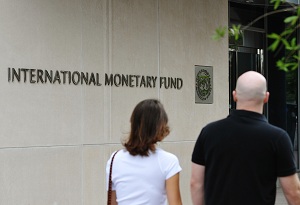
An International Monetary Fund (IMF) technical team has started the latest round of negotiations with the Egyptian Government over the proposed $4.8 billion loan.
The delegation is supposed to discuss actions to solve the Egyptian economy’s persisting problems; a budget deficit that rose to 11 per cent of gross domestic product, massive youth unemployment and worsening foreign reserves.
Former Finance Minister, Samir Radwan, whose tenure was extended under the premiership of both Ahmed Shafiq and Essam Sharaf, welcomed the resumption of negotiations and emphasised the importance of the loan to Egypt, especially in today’s dire economic circumstances.
“I began the negotiations with the IMF during my tenure, but the negotiations failed due to domestic opposition. Now the situation is much worse and there is now way around signing with the IMF,” Radwan told the Daily News Egypt.
The IMF loan is not only about the $4.8 billion, he added, it is also “a certificate of good conduct for the Egyptian economy,” one that could mobilise funds from other financial institutions to Egypt.
“Enough time wasting,” said Radwan, “we’ve already wasted 18 months, and missed many opportunities due to statements of financial experts that we never heard of before, who don’t have enough knowledge on the matter. Simply put, we need the funding of international institutions.”
On the issue of subsidies, Radwan insisted that they must be phased-out gradually starting with ones benefiting the rich “We can’t remove the all subsidies tomorrow morning can we!”
The head of the economic committee at the Freedom and Justice Party, Abdulla Shehata, refused to comment on the IMF’s visit saying that “we have adopted a policy within the committee not to comment on anything related to the International Monetary Fund or the loan issue.”
The government has worked out a reform programme to meet the loan requirements set by the IMF.
The IMF director for the Middle East and North Africa, Masood Ahmed, told Reuters that “The programme has to address the challenges that Egypt now faces.
“[They are] quite formidable and they are both short-term challenges in terms of strengthening fiscal and external resilience, but also the challenge of laying the foundation for a revival of economic activity over the medium term that is going to provide jobs.”
The senior IMF official confirmed that the objective of the negotiations would be to eliminate any wasteful subsidies, especially in the energy sector, to channel the resources towards the health and education sectors, and to spend more on the infrastructure development.
Ahmed told Ahram online that the government is still working out some of the details, but the broad outlines are clear, and that there are two challenges that need to be faced, the first one is to restore confidence in the Egyptian economy, the second challenge is to move forward and create a better economic future for all Egyptians, by targeting a higher and more inclusive growth rate; a growth rate that generates job opportunities, and provides equal opportunities for everyone.
An agreement with the IMF is also important to unblock $1 billion in aid offered by Europe and the United States, in the framework of the Deauville Partnership. The partnership was launched in May 2011 by the European Union and the G-8 to provide financial support for the Arab Spring countries.



